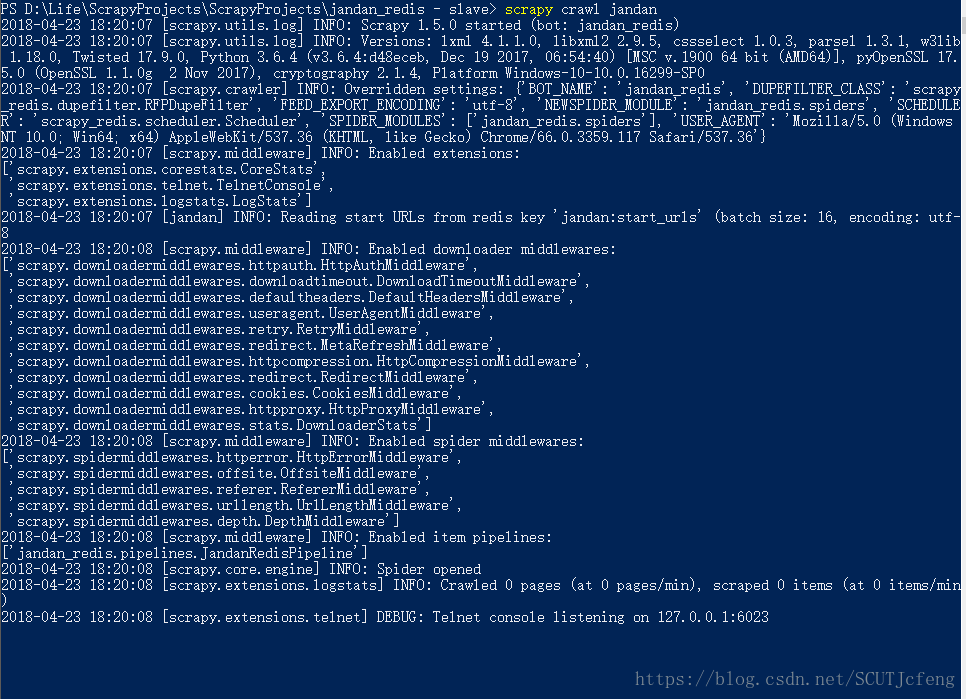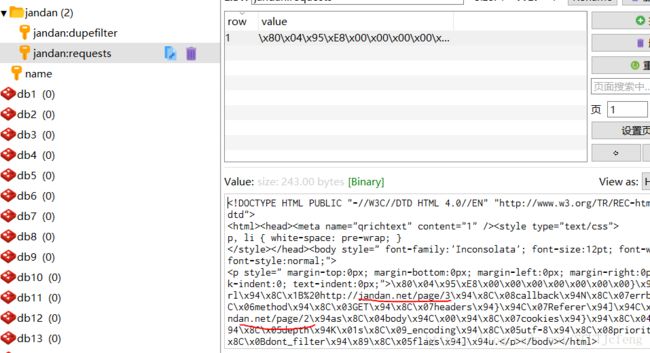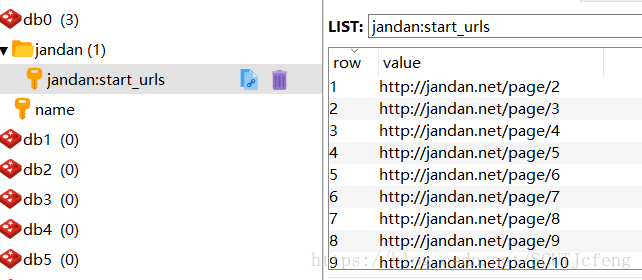Scrapy-redis学习系列之一:初识scrapy-redis
Scrapy-redis学习系列之一:初识scrapy-redis
写在最前
本项目Github地址:https://github.com/SCUTJcfeng/Scrapy-redis-Projects
一、scarpy-redis介绍
scrapy-reids官方介绍的三个特性如下:
- Distributed crawling/scraping(分布式爬虫)
You can start multiple spider instances that share a single redis queue. Best suitable for broad multi-domain crawls.
(你可以在启用多个spider实例的时候分享同一个redis队列。这对广泛多域抓取来说是最合适的。)
- Distributed post-processing(分布式后处理)
Scraped items gets pushed into a redis queued meaning that you can start as many as needed post-processing processes sharing the items queue.
(抓取的items被推入redis队列中,这意味着你可以在启用尽可能多的后处理流程的时候分享同一个items队列。)
- Scrapy plug-and-play components(Scrapy即插即用的组件)
Scheduler + Duplication Filter, Item Pipeline, Base Spiders.
(这几个组件都是用来替换Scrapy原生组件用的。)
简单来说,scarpy-redis就是用来在scrapy中实现分布式的组件。scarpy-redis的主要特性介绍完了,详细的请到scarpy-redis的Github主页查看。
二、最简单的scarpy-redis项目
在原Scrapy项目的基础上修改即可。
1. 修改settings.py
Github项目主页上有settings推荐,这里贴一下:
# Enables scheduling storing requests queue in redis.
SCHEDULER = "scrapy_redis.scheduler.Scheduler"
# Ensure all spiders share same duplicates filter through redis.
DUPEFILTER_CLASS = "scrapy_redis.dupefilter.RFPDupeFilter"
# Default requests serializer is pickle, but it can be changed to any module
# with loads and dumps functions. Note that pickle is not compatible between
# python versions.
# Caveat: In python 3.x, the serializer must return strings keys and support
# bytes as values. Because of this reason the json or msgpack module will not
# work by default. In python 2.x there is no such issue and you can use
# 'json' or 'msgpack' as serializers.
#SCHEDULER_SERIALIZER = "scrapy_redis.picklecompat"
# Don't cleanup redis queues, allows to pause/resume crawls.
#SCHEDULER_PERSIST = True
# Schedule requests using a priority queue. (default)
#SCHEDULER_QUEUE_CLASS = 'scrapy_redis.queue.PriorityQueue'
# Alternative queues.
#SCHEDULER_QUEUE_CLASS = 'scrapy_redis.queue.FifoQueue'
#SCHEDULER_QUEUE_CLASS = 'scrapy_redis.queue.LifoQueue'
# Max idle time to prevent the spider from being closed when distributed crawling.
# This only works if queue class is SpiderQueue or SpiderStack,
# and may also block the same time when your spider start at the first time (because the queue is empty).
#SCHEDULER_IDLE_BEFORE_CLOSE = 10
# Store scraped item in redis for post-processing.
ITEM_PIPELINES = {
'scrapy_redis.pipelines.RedisPipeline': 300
}
# The item pipeline serializes and stores the items in this redis key.
#REDIS_ITEMS_KEY = '%(spider)s:items'
# The items serializer is by default ScrapyJSONEncoder. You can use any
# importable path to a callable object.
#REDIS_ITEMS_SERIALIZER = 'json.dumps'
# Specify the host and port to use when connecting to Redis (optional).
#REDIS_HOST = 'localhost'
#REDIS_PORT = 6379
# Specify the full Redis URL for connecting (optional).
# If set, this takes precedence over the REDIS_HOST and REDIS_PORT settings.
#REDIS_URL = 'redis://user:pass@hostname:9001'
# Custom redis client parameters (i.e.: socket timeout, etc.)
#REDIS_PARAMS = {}
# Use custom redis client class.
#REDIS_PARAMS['redis_cls'] = 'myproject.RedisClient'
# If True, it uses redis' ``SPOP`` operation. You have to use the ``SADD``
# command to add URLs to the redis queue. This could be useful if you
# want to avoid duplicates in your start urls list and the order of
# processing does not matter.
#REDIS_START_URLS_AS_SET = False
# Default start urls key for RedisSpider and RedisCrawlSpider.
#REDIS_START_URLS_KEY = '%(name)s:start_urls'
# Use other encoding than utf-8 for redis.
#REDIS_ENCODING = 'latin1'我这里贴一下我settings.py相关代码:
BOT_NAME = 'jandan_redis'
SPIDER_MODULES = ['jandan_redis.spiders']
NEWSPIDER_MODULE = 'jandan_redis.spiders'
USER_AGENT = 'Mozilla/5.0 (Windows NT 10.0; Win64; x64) AppleWebKit/537.36 (KHTML, like Gecko) Chrome/66.0.3359.117 Safari/537.36'
ROBOTSTXT_OBEY = False
ITEM_PIPELINES = {
'jandan_redis.pipelines.JandanRedisPipeline': 300,
}
# 以下为scrapy-redis相关设置
SCHEDULER = "scrapy_redis.scheduler.Scheduler"
DUPEFILTER_CLASS = "scrapy_redis.dupefilter.RFPDupeFilter"
# REDIS_HOST = 'localhost'
# REDIS_PORT = 6379其中SCHEDULER和DUPEFILTER_CLASS是必须的是,另外因为我是本机执行,默认端口,所以REDIS_HOST和REDIS_PORT不填也可以。
2. 改写Spiders
修改的内容有下面三个地方:
引入新的Spider类
RedisCrawlSpider,替换原来的scrapy.Spider;start_urls去掉,改为redis_key,记住这个key,后面会用到;__init__函数修改,引入*args和**kwargs。
# -*- coding: utf-8 -*-
from scrapy_redis.spiders import RedisCrawlSpider
from jandan_redis.items import JandanRedisItem
class JandanSpider(RedisCrawlSpider):
name = 'jandan'
redis_key = 'jandan:start_urls'
def __init__(self, *args, **kwargs):
super(JandanSpider, self).__init__(*args, **kwargs)
self.page = 2
def parse(self, response):
colums = response.xpath('//*[@id="content"]/div/div/div/h2/a')
for colum in colums:
item = JandanRedisItem()
item['title'] = colum.xpath('text()').extract_first()
item['title_url'] = colum.xpath('@href').extract_first()
yield item
self.page += 1
next_url = 'http://jandan.net/page/%d' % self.page
yield scrapy.Request(next_url)
pass3. items.py和pipelines.py不变
items.py:
import scrapy
class JandanRedisItem(scrapy.Item):
# define the fields for your item here like:
title = scrapy.Field()
title_url = scrapy.Field()
passpipelines.py:
# -*- coding: utf-8 -*-
# Define your item pipelines here
#
# Don't forget to add your pipeline to the ITEM_PIPELINES setting
# See: https://doc.scrapy.org/en/latest/topics/item-pipeline.html
import pymysql
class JandanRedisPipeline(object):
def __init__(self):
super().__init__(
def create_table(self):
self.db = pymysql.connect(
host='127.0.0.1', user='root', password='root', database='test', charset='utf8')
sql = '''CREATE TABLE
IF
NOT EXISTS `jdan` (
`id` INT ( 10 ) NOT NULL AUTO_INCREMENT,
`title` VARCHAR ( 255 ) NOT NULL,
`title_url` VARCHAR ( 255 ) NOT NULL,
PRIMARY KEY ( `id` )
) ENGINE = INNODB DEFAULT CHARSET = utf8'''
with self.db.cursor() as cursor:
cursor.execute(sql)
self.db.commit()
def drop_table(self):
sql = '''DROP TABLE IF EXISTS `bra`'''
with self.db.cursor() as cursor:
cursor.execute(sql)
self.db.commit()
def save_to_table(self, title, title_url):
sql = '''INSERT INTO `jdan` (`title`, `title_url`) VALUES
('%s', '%s')''' % (title, title_url)
with self.db.cursor() as cursor:
cursor.execute(sql)
self.db.commit()
def process_item(self, item, spider):
self.create_table()
self.save_to_table(
item['title'], item['title_url'])
return item
pass4. 复制一份项目,重命名为xxx-slave
是的,上面的项目就是master,slave与master的不同很少,这里举最简单的例子,在settings.py添加:
REDIS_URL = 'redis://@127.0.0.1:6379'REDIS_URL默认会将·REDIS_HOST和REDIS_PORT的设置覆盖掉,所以这两个可以不注释,不过还是建议注释掉。
5. 运行项目
- 输入初始url
现在我们有2个项目,一个slave,一个是master,先运行master。在master的目录下运行scrapy crawl jandan,运行master的spider;slave的spider先等一会。
在命令行运行的话你应该看到:

如果你在pycharm下运行,可能看到的是这样的:

spider已经启动了,但是没有爬起来,这是因为初始URL还没设,下面再命令行打开redis-cli,传入初始url,key就是我们在JandanSpider设置的redis_key,亦即jandan:start_urls。
命令行输入:
redis-cli.exe -p 6379
127.0.0.1:6379> lpush jandan:start_urls http://jandan.net/page/2最后运行slave:scrapy crawl jandan
- (option)暂停一下,看看RDM
lpush jandan:start_urls http://jandan.net/page/2,你到RDM一看:

项目一跑起来,该值就会被取出,随后删除。
然后有新的请求加入:

jandan:requests中有一行,可以看到这个是下一个要出列的requests,下一个是page3;
jandan:dupefilter也有一行,是用来存放已经爬取过的requests的指纹(page2),值为3f1a1b57b6cab231d260d6a938b1a0f6077ebc6d。
6. 改进
问题一:slave不运作,只有master运作。
原因:requests队列只有一个,master有优先权
措施:模拟添加多个jandan:start_urls队列
import redis
r = redis.Redis()
for i in range(3, 100):
r.rpush('jandan:start_urls', 'http://jandan.net/page/%d' % i)问题二:没有实现master处理items,slave处理requests
原因:第一个项目嘛…
措施:Scrapy-redis学习系列之二
以上。


